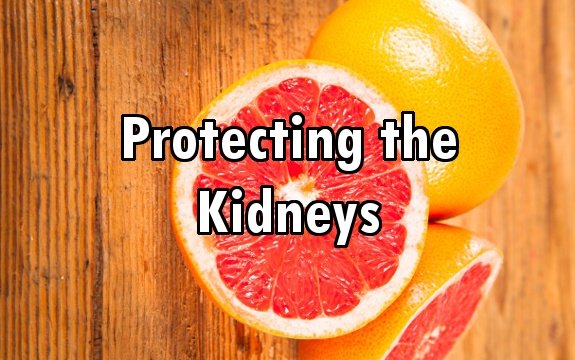Grapefruit Compound can Protect Kidneys, Prevent Cysts

 If you don’t suffer from it or know someone who does, you may not even know what polycystic kidney disease (PKD) is. But not only is the disease relatively common, it is one of the leading causes of kidney failure. Thankfully, a new study indicates a flavonoid in grapefruit could hold the key to preventing cysts associated with the disease and treating PKD overall.
If you don’t suffer from it or know someone who does, you may not even know what polycystic kidney disease (PKD) is. But not only is the disease relatively common, it is one of the leading causes of kidney failure. Thankfully, a new study indicates a flavonoid in grapefruit could hold the key to preventing cysts associated with the disease and treating PKD overall.
PKD affects some 500,000 people in the US and is the fourth-leading cause of kidney failure. It’s a genetic disease characterized by the growth of cysts in the kidneys. These cysts can lead to kidney enlargement and ultimately failure.
Researchers with Royal Holloway University of London have found naringenin, a compound responsible for the bitter flavor in grapefruit, could help prevent these cysts and the complications associated with PKD.
The researchers found that naringenin is able to regulate the protein responsible for PKD, known as PKD2. While naringenin is also found in other citrus fruits, it is most concentrated in grapefruit.
But, before you run out for a bag of grapefruits, the researchers say the amount needed to effectively prevent cysts can only be obtained through supplements or intravenous injection. Still, they hope their research could ultimately play a role in a natural treatment for sufferers of PKD.
Read: Health Benefits of Grapefruit
“This discovery is vital in helping us to understand how polycystic kidney disease may be controlled and ultimately treated,” said Professor Robin Williams from the School of Biological Sciences at Royal Holloway. “Kidney disease is a debilitating condition that can be fatal and finding a treatment is a truly urgent health priority.”
“In the study, we have demonstrated how effective the amoeba Dictyostelium is in the discovery of new treatments and their targets. Having previously applied the same method of testing in our work into epilepsy and bipolar treatments, it is clear that this new approach could help us reduce reliance on animal testing and provide major improvements.”
More than kidney disease, naringenin has also been shown to aid in the treatment of hardening of the arteries, diabetes, hypermetabolism and even cancer—effectively slowing the spread of tumors.
Still Andrew Weil, MD cautions that supplementing with naringenin can have negative effects if you are on certain types of pharmaceuticals. (In fact, scientists are actually modifying grapefruit to accommodate various medications.) Statins, calcium channel blockers, non-sedating anti-histamines, anti-anxiety medications, immunosuppressive drugs, and antiviral drugs are among the drugs that should not be mixed with grapefruit.
